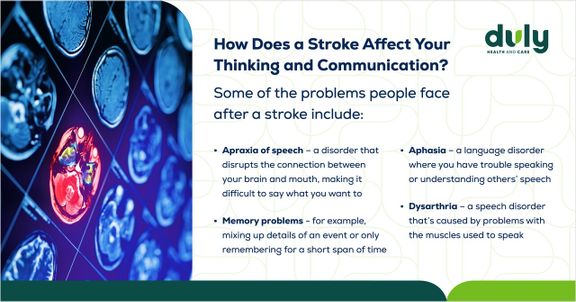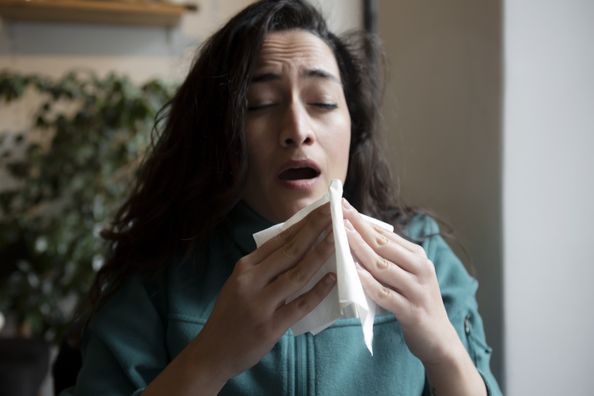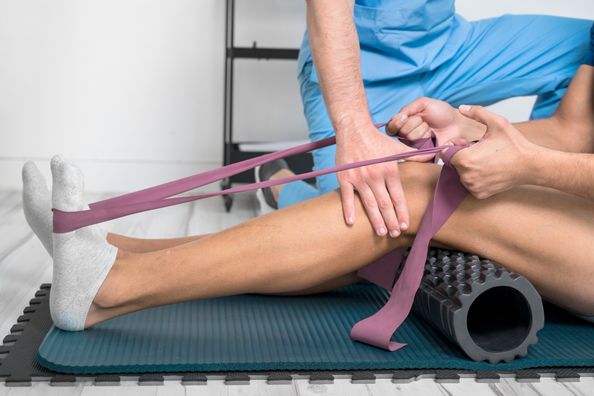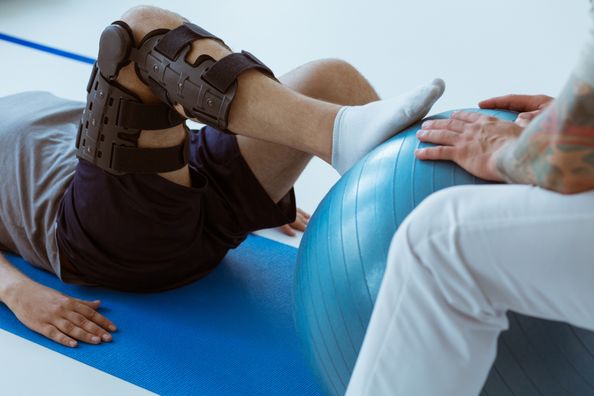You have survived a stroke. You spent a few days in the hospital where you started rehab. And now, you’re back home – and you’re not quite sure what to expect.
A stroke is a life-changing event. It occurs when there is sudden bleeding in your brain or there’s a blockage of blood flow to your brain. It is a medical emergency that can lead to long-term disability or permanent brain damage and can even be life-threatening, so it’s natural to be confused and overwhelmed after surviving a stroke when you think about what’s ahead.
There are many different ways in which a stroke may affect you, and no two strokes are exactly alike. However, there are some effects that are common. Here are some ways in which a stroke may affect you and which types of providers can help you work through the challenges and changes.
The Extent of Damage and Location of the Stroke Make a Difference
The effects of a stroke depend on how much brain tissue is damaged and where in the brain the stroke occurs.
For example, a stroke in the brainstem (the base of the brain that controls functions like heartbeat and blood pressure) can result in heart function or breathing problems. A stroke at the back of the brain, where the occipital lobe (the lobe that controls vision) is housed, may cause problems with your sight.
A Stroke Can Have Significant Physical Effects
Two of the main physical complications of a stroke are weakness or paralysis on one side of the body and spasticity:
- Paralysis (inability to move) and weakness occur on the side of your body opposite the side of the brain where the stroke occurred.
- Spasticity is when a muscle involuntarily contracts (flexes or shortens) when you move, causing the muscle to become stiff or and making it difficult to stretch.
In addition, a stroke can lead to physical effects such as fatigue, pain, and seizures.
If you experience these effects after a stroke, a physical therapist can become your best friend. Your physical therapist can lead you in exercises to relearn movement and coordination skills and get you back on your feet. If the stroke has caused changes to your ability to move, your therapist can also help you learn how to best use mobility devices like canes and walkers or fit you with an ankle brace to help stabilize and strengthen your ankle.
If you need physical therapy after a stroke, schedule an appointment with a South Bend Clinic physical therapist.
Strokes Can Disrupt Activities of Daily Living
Your body relies on fine motor skills – the tiny, precise movements you make with your hands, fingers, feet, and toes – to do everyday tasks, from eating to reading a book to getting dressed. There are several factors that affect your ability to use fine motor skills, like awareness and planning, muscle strength, and coordination.
A stroke can cause problems with these factors, impairing your fine motor skills and making it challenging to do activities that you’re used to doing without giving them a second thought.
Working with an occupational therapist is key for regaining fine motor skills or learning to adapt if there is permanent damage. They can help you become more independent after a stroke by helping you relearn activities of daily living (ADLs).
Basic ADLs are skills you need to manage your essential physical needs, such as:
- Personal hygiene, like bathing and brushing your teeth
- Getting dressed
- Feeding yourself
- Walking independently
- Controlling bladder and bowel function
- Using the bathroom
Your occupational therapist can also help with instrumental ADLs, which involve more complex thinking and organizational skills. These are the skills you use to live independently in your community, such as managing finances, cooking, cleaning, driving, shopping, and working.
Strokes Can Also Change How You Think or Communicate With Others
Cognitive impairment (difficulty thinking, learning, making decisions, remembering, or using your judgment) and problems with communication are both common after a stroke.

These challenges can be frustrating, but it’s important to remember that these problems affect certain skills, but they do not cause you to lose any intelligence. Your intelligence has not changed since the stroke.
Speech-language specialists and occupational therapists can help you manage these problems and regain the skills you’ve lost.
Your Vision Might Move Further From 20/20
If a stroke has affected your vision, you’re in good company. Vision problems affect about 65% of stroke survivors. A stroke doesn’t necessarily cause complete blindness. For instance, it can cause a loss in a portion of the visual field (the area you see in front of you).
The good news is that, while you might not be able to entirely regain your vision, there are several treatments to help you compensate for vision loss. An eye doctor, like an optometrist or ophthalmologist, or a neurologist can work with you on therapies like scanning (training your eyes to scan away from areas of vision loss) or adding prisms to your eyeglasses.
Your Feelings and Personality Might Be Different From What You’re Used To
From depression to anxiety to sudden mood swings to becoming easily annoyed, strokes are known to affect emotions and personality. There are a few reasons why this can happen.
It may be because the stroke affected the parts of your brain that control mood, personality, and your ability to interact with others. It may be due to the stress and the emotional toll of a stroke and its aftermath. Or it could be a combination of both.
Regardless of what is causing changes in how you feel or behave, a behavioral health specialist like a therapist or psychologist can help you keep your mental health intact after a stroke.
Everyone has a different experience after a stroke, and some people have lifelong effects while others fully recover. There’s no “normal” outcome. But there is one thing that is for sure; with the right team of providers who focus on your individual needs, you won’t need to go through recovery alone.
Health Topics:









